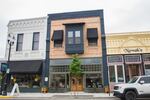A proposal in the Oregon Legislature could affect what the state's neighborhoods look like for decades to come.
House Bill 2001 would increase density in single-family neighborhoods in the Portland metro area and every other city in the state with a population above 25,000. If passed, the bill would allow developers to build up to four units of attached housing, cottage clusters and townhouses in areas that are currently zoned exclusively for single-family homes.
The bill would also require smaller cities — with a population between 10,000 and 25,000 — to allow duplexes in single-family zones.
Oregon House Speaker Tina Kotek, D-Portland, says the bill is an effort to address housing affordability by adding more housing units to the state's supply, which by one estimate falls more than 150,000 units short of demand.
Supporters of the bill say it would do that by making neighborhoods denser and adding more “middle housing,” which is the term for housing options that fall somewhere on the spectrum between single-family homes and larger apartment complexes.
Over the last month, we’ve talked to numerous people about House Bill 2001 to hear their thoughts on whether this is the right solution for Oregon’s housing crunch.
The Professor
Lisa Bates is an associate professor of urban studies and planning at Portland State University. She said historically zoning has acted as a way to keep neighborhoods economically and racially segregated.

Portland State University professor Lisa Bates says that the substantial amount of single-family zoning in Oregon creates a problem for housing supply.
Samantha Matsumoto / OPB
“The origins and the purposes of exclusionary single-family zoning have often been not only classist but very explicitly racist,” Bates said.
She thinks it’s a problem that so much of the land in Oregon cities is zoned for single-family use. It affects the state’s housing supply, she said, and it gives owners of single-family homes more power to determine what housing is available for everyone else.
“Duplexes and quadplexes, those are useful and important parts of a housing market,” Bates said. “As we have a conversation about the housing affordability crisis in Oregon, and a lack of supply of housing in Oregon, we have to look back to exclusionary single-family zoning as a large part of the reason of why we have that shortfall.”
The Realtor
Portland realtor Laura Wood is skeptical that this bill will fix anything. Her clients range from first-time home buyers to empty nesters who are downsizing. And in general, she said, they aren’t interested in duplexes or triplexes.
Instead, most of her clients want single-family houses. Her clients, especially millennials who are moving to Portland, are looking for neighborhoods where they know their neighbors, where they can walk their dogs and where they can have a sense of community.
“I have a lot of first-time homebuyers, and they all want exactly what I want,” Wood said. “They want a house in a neighborhood.”
Wood agrees with House Bill 2001’s goals of adding more affordable housing and making neighborhoods denser. But she doesn’t know if this plan will work the way lawmakers think.
Wood worries that the bill wouldn’t lead to developers building affordable housing. Instead, she said, it will lead to developers scraping small houses to build expensive duplexes.
“It’s going to go where the money is,” she said. “That’s the problem.”
The Affordable-Housing Developer
Steve Messinetti, the CEO of Habitat for Humanity Portland/Metro East, agrees with Wood that developers would build luxury duplexes in some neighborhoods if House Bill 2001 passes.

Steve Messinetti, the CEO of Habitat for Humanity Portland Metro East, says that House Bill 2001 would allow nonprofit developers like Habitat to build more affordable housing.
Samantha Matsumoto / OPB
But he also believes that the bill would make it easier for nonprofit and affordable-housing developers like Habitat for Humanity to build more affordable housing. In the metro area, Habitat for Humanity mainly builds middle housing because it can house more people on one lot. That allows Habitat to maximize housing units for the cost of the land, Messinetti said.
But, Habitat is limited by how Portland is zoned, according to Messinetti. Generally, the city is zoned for large multifamily buildings that exceed the minimum number of units Habitat for Humanity can afford to build or it’s zoned for single-family homes on lots that are too expensive to make it worth building a home for just one family.
“Frankly, the biggest challenge is that there’s not a lot of property zoned for [middle housing],” he said.
Messinetti believes that House Bill 2001 would help fix the housing affordability problem in Oregon.
“Something’s gotta give and something bold needs to be done,” he said. “And I think this is a step in the right direction.”
The Mid-Sized City Mayor

Mayor Sharon Konopa, who has held her position for 11 years, likes to take visitors on tours of Albany. She says HB 2001 will have an adverse effect on this city of about 53,000 people.
Laurie Isola / OPB
Cities outside the Portland metro area have different concerns.
Albany Mayor Sharon Konopa thinks that the state shouldn't tell cities how to make zoning decisions. House Bill 2001 is trying to force a Portland solution for the housing crunch onto smaller cities like hers, she said.

A building in downtown Albany, Ore., makes use of upper floor housing.
Laurie Isola / OPB
"We’re the ones that know what would be a good fit for our community,” she said. “And we spend years trying to be able to plan for our community and looking long range.”
Konopa said she is supportive of rental and mixed-use housing, but she wants it to be in the areas that are already zoned for it. If House Bill 2001 passes, she thinks it would erode away Albany’s single-family neighborhoods, and that homebuyers’ investments in their houses will suffer if the neighborhoods change.
Konopa has lived in Albany for most of her life, and she loves her hometown, she said. That’s why she is wary of the state coming in to change it.
“You have that certain character of a neighborhood, and we just want to be able to make sure we preserve that character,” she said.
The Lawmaker
House Speaker Tina Kotek said that the entire state needs to take action on housing in order to address housing affordability.
“We’re in a crisis,” she said. “The state does need to take a leading role to really push local government to do this work.”
The state is behind in housing supply, she said, and that means the state has to look at its housing policies. House Bill 2001 would allow more choice in housing options.
Kotek disagrees with the idea that this plan would change the character of neighborhoods – at least not overnight.
“This is critical, and it’s also going to be gradual change,” she said. “But we need to make this change now so in the next 20 to 30 years, we will see more diverse housing types in all neighborhoods.”
Contact "Think Out Loud"
If you'd like to comment on any of the topics in this show, or suggest a topic of your own, please get in touch with us on Facebook or Twitter, send an email to thinkoutloud@opb.org, or you can leave a voicemail for us at 503-293-1983. The call-in phone number during the noon hour is 888-665-5865.

